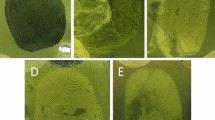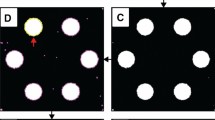Abstract
RECENT experience with the wet-film indian ink method, used by Duguid1 for demonstrating bacterial capsules and slime, suggests that it can be used for examining the structure of a wide range of living micro-organisms. To be effective for this purpose, an ink should have very small, uniformly sized particles, should spread evenly and should not coagulate too readily. These requirements are met by ‘Pelican’ black drawing ink, though it does coagulate to some extent in acidic suspensions. Several other inks proved unsatisfactory, chiefly because of larger and more variable particle-size.
This is a preview of subscription content, access via your institution
Access options
Subscribe to this journal
Receive 51 print issues and online access
$199.00 per year
only $3.90 per issue
Buy this article
- Purchase on Springer Link
- Instant access to full article PDF
Prices may be subject to local taxes which are calculated during checkout
Similar content being viewed by others
References
Duguid, J. P., J. Path. and Bact., 63, 673 (1951).
Author information
Authors and Affiliations
Rights and permissions
About this article
Cite this article
RISHBETH, J. The Wet-film Indian Ink Method for examining Micro-organisms. Nature 174, 361–362 (1954). https://doi.org/10.1038/174361a0
Issue Date:
DOI: https://doi.org/10.1038/174361a0
Comments
By submitting a comment you agree to abide by our Terms and Community Guidelines. If you find something abusive or that does not comply with our terms or guidelines please flag it as inappropriate.



